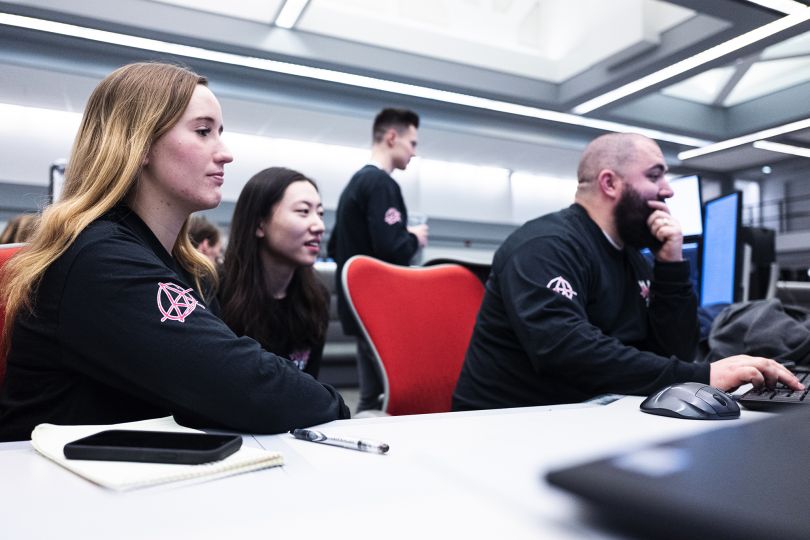
Companies all over have invested a lot of time and resources in obtaining customer loyalty. But what about employee loyalty?
Alas, only 33 percent of executives say employee loyalty is a top priority, according to The Predictive Index, a talent optimization company. The good news? The following three Chicago-based executives fall within that statistic. In fact, according to these leaders, they’ve worked tirelessly over the years to ensure employees feel respected, trusted, heard and empowered on a daily basis.
Built In Chicago connected with Denise Dunlap, chief people officer at PEAK6, Taylor Katzman, chief executive officer at Provi, and Taylor Somach, vice president of merchant relationships at PerkSpot, to learn their secrets for developing — and maintaining — employee loyalty. They shared how creating open lines of communication, developing personal relationships and encouraging idea development has led to high employee retention rates.
PEAK6 is an investment and fintech firm committed to supporting ventures that use technology to improve processes. For Chief People Officer Denise Dunlap, building employee loyalty means allowing team members’ voices to be heard. She said that inviting feedback on processes and encouraging idea development results in loyal, happy and eventually long-tenured employees.
What is the key to developing employee loyalty, and what does this look like in action?
The PEAK6 culture invites employees to be heard. Good ideas can come from anywhere and anyone. The company invites feedback and encourages employees to help the firm continuously improve. There are countless examples of employees who developed a plan, process or new technology and they are given the runway to give it a try. You don’t have to be a senior leader to have a good idea or have a decade of experience to lead an initiative or be a CEO of one of our portfolio companies.
A workplace that encourages employees to tackle challenges and explore opportunities also cultivates leaders of all levels of experience. Employees can look around and see examples of their colleagues who started in one role and are quickly given the opportunity to apply their skills to other parts of the firm. It’s not uncommon to see former interns who are now managing teams and taking on significant leadership roles. When employees are given opportunities to learn, grow and expand their skill sets, they have every reason to stay with a company that understands the value they contribute to the organization.
A workplace that encourages employees to tackle challenges and explore opportunities cultivates leaders of all levels of experience.”
What impact has employee loyalty had on your business over the years?
Due to our tremendous growth, we have many one, two and three-year anniversaries, but I find it remarkable to see so many of our employees hitting their 10, 15 and even 20-year anniversaries. Most of our long-tenured employees have held a variety of roles, often across our businesses. There is a commonality in our longer-term employees — they share a similar work DNA. They all possess the ability to work in a fast-paced environment and quickly adapt to changing markets and environments.
The most tenured employees know change is essential to drive the business forward. You don’t hear, “This is how it has always been done.” Instead, you hear, “How can we make it better?” Fundamentally, our employees who have been with us longer are truly committed to our core values. Our core values aren’t just rhetorical — they define how we make decisions and run our businesses.
Provi is a software platform that connects beverage alcohol retailers and buyers with a goal of creating an equal and competitive marketplace. CEO Taylor Katzman said that the key to developing employee loyalty is to build trust with employees and empower them to make their decisions.
What is the key to developing employee loyalty, and what does this look like in action?
Trust. In a fast-moving company with enormous opportunity, it’s essential to give people enough space to take ownership and expand their own capabilities. As an organization, we built trust by empowering employees to make decisions, as well as providing feedback based on their own expertise and execution. When you create an environment that encourages open lines of communication, collaboration and accountability, your employees become more confident in their work, grow in their role and become passionate about not only the product but also the culture here.
When you create an environment that encourages open lines of communication, your employees become more confident in their work.”
What impact has employee loyalty had on your business over the years?
Our emphasis on developing loyalty with employees has paid off exponentially — especially in regard to our engineering pipeline. Currently, three of our engineering staff started their careers at Provi in different departments. By investing in their skills, those employees excelled in their initial roles and gained the experience needed to make the transition.
Those internal promotions are huge for us! Every tech company struggles with filling its engineering pipeline. Attracting quality candidates and competing with other tech companies can be a major challenge. Here, we never forget that Provi can be its own pipeline. There are a million ways to further your career and a million paths to get there.
PerkSpot aims to help companies attract and engage their employees with exclusive perks, benefits and discounts. For Vice President of Merchant Partnerships Taylor Somach, employee loyalty is a two-way street. He said that by treating his employees with the same respect and trust asked of them has resulted in very little turnover in the last few years.
What is the key to developing employee loyalty, and what does this look like in action?
I think it first starts with the realization that loyalty is a two-way street. Our employees deserve the same respect, trust and commitment to their success that we ask of them.
Developing personal relationships within the team allows me to get to know my colleagues beyond their professional contributions, and I hope it allows them to bring their whole selves to work. This creates strong bonds to each other and also to the company that fosters these relationships.
Developing personal relationships within the team allows me to get to know my colleagues beyond their professional contributions.”
What impact has employee loyalty had on your business over the years?
Put simply, my team has had very little turnover because even through challenging times like the COVID-19 pandemic, they put their faith in me and the company to do what was right. I knew they were trying their hardest and when we asked them to do a 180-degree turn to adapt to changing consumer demands, they answered the call beyond expectations. As we have significantly grown the team over the last two years, the team veterans are the cornerstone of our culture and invaluable in training and mentoring newer employees.










